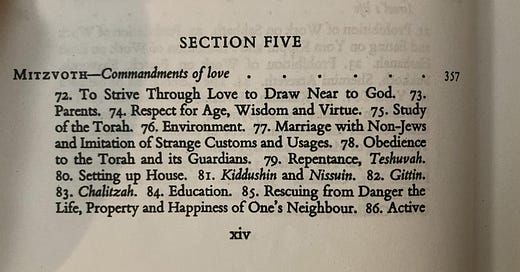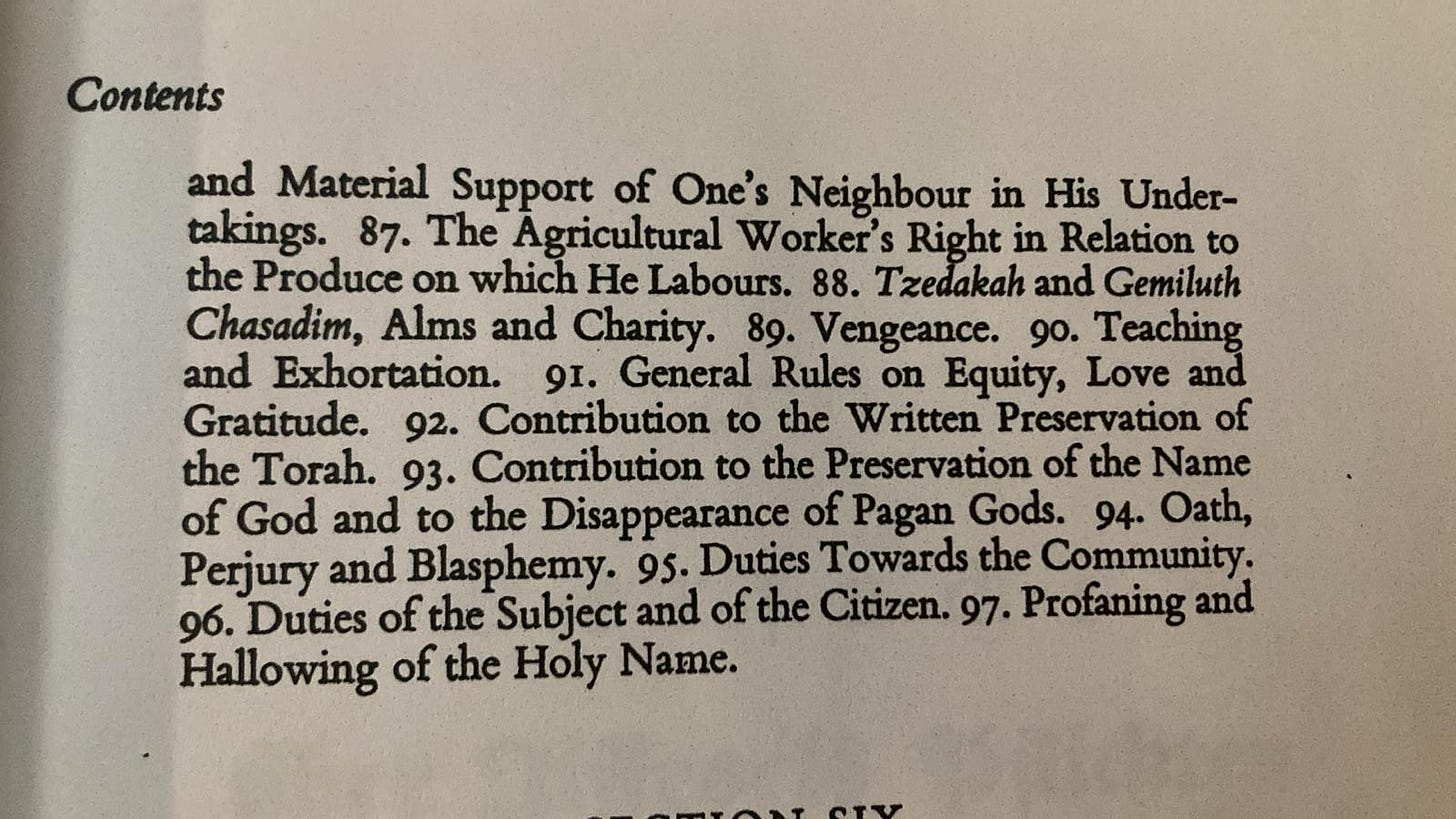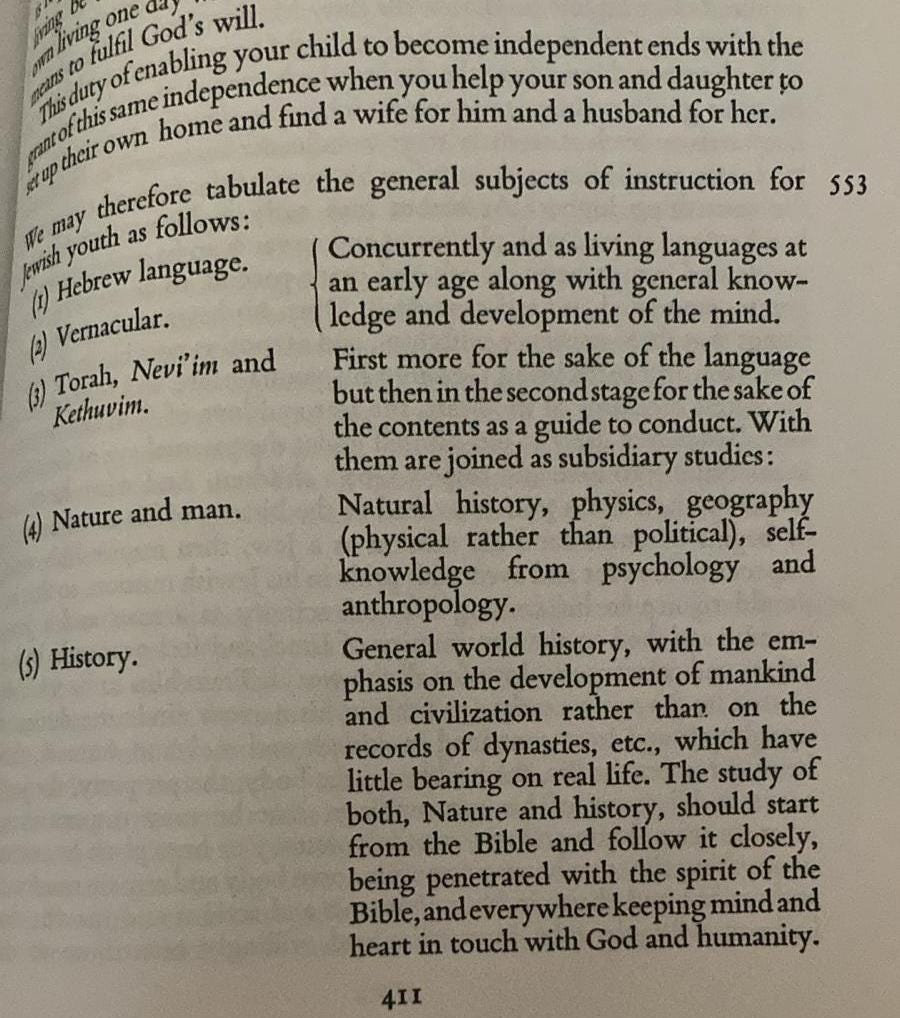The previous letter highlighted fundamental ideas (Toros) and mitzvos based on the ideal of justice (Mishpatim and Chukkim). In this letter, Rav Hirsch presents the category of commandments based on love — Mitzvos. In Horeb, he lists these mitzvos:
Summary
In the letter, Rav Hirsch divides these mitzvos into three groups, which he eventually describes as concentric circles of love.
Preparing oneself for one’s mission in life — to be a blessing to oneself and to others
This includes respecting and honoring parents and elders, learning Torah, getting married and establishing a home.
The inclusion of learning Torah in this context aligns with his general understanding of the goal of learning Torah — to teach oneself Divine ideals and receive Divine guidance regarding how to live life. Alternatively, learning Torah serves as the “womb” (Torah from the language of harah, to conceive) that eventually delivers a Divinely molded product who can live life in the most ideal way possible.
The “loving bestowal of blessings upon others”
Educating one’s children (“by the sacrifice of your entire self, by becoming everything to them — even though they cannot rightfully demand this — in order to raise them and in order for you to live on in them”).
Bestowing blessings beyond the home
Save a person’s life, property, or happiness; help suffering animals; perikah and teinah, lending money, all forms of chessed.
Rav Hirsch concludes by attaching this mitzvah to kiddush Hashem, labelling that the ultimate goal of the entire endeavor:
Thus you are to strive to sanctify God's Name by your entire way of life, within your closest circle as well as your wider domain, in each and every way that you can. Thereby you will provide an enduring reminder of, and bear testimony to, God's rule and the mission of mankind. Your example will enlighten and inspire your brethren within the people of Yisrael and, above all, your non-Jewish brethren, and will teach them to venerate and love the One and Only God as their God, too, with all their heart, all their soul and all their resources, and to live a life of justice and love according to His Will. In other words, you, in your limited circle, as an individual, can fulfill the very task that, on a larger scale, constitutes the mission of your entire nation.
Fittingly, kiddush and chillul Hashem are the last mitzvos in the section in Horeb.
Diving Deeper
Relating to Non-Jewish Host Societies
Rav Hirsch also includes supporting the community and state as a mitzvah. This is one of the most unusual entries, as the source he cites is from Yirmiya 29:5, rather than a pasuk in the Chamishei Chumshei Torah:
כֹּה אָמַר יְהֹוָה צְבָאוֹת אֱלֹהֵי יִשְׂרָאֵל לְכׇל־הַגּוֹלָה אֲשֶׁר־הִגְלֵיתִי מִירוּשָׁלַ͏ִם בָּבֶלָה׃
בְּנוּ בָתִּים וְשֵׁבוּ וְנִטְעוּ גַנּוֹת וְאִכְלוּ אֶת־פִּרְיָן׃
קְחוּ נָשִׁים וְהוֹלִידוּ בָּנִים וּבָנוֹת וּקְחוּ לִבְנֵיכֶם נָשִׁים וְאֶת־בְּנוֹתֵיכֶם תְּנוּ לַאֲנָשִׁים וְתֵלַדְנָה בָּנִים וּבָנוֹת וּרְבוּ־שָׁם וְאַל־תִּמְעָטוּ׃
וְדִרְשׁוּ אֶת־שְׁלוֹם הָעִיר אֲשֶׁר הִגְלֵיתִי אֶתְכֶם שָׁמָּה וְהִתְפַּלְלוּ בַעֲדָהּ אֶל־יְהֹוָה כִּי בִשְׁלוֹמָהּ יִהְיֶה לָכֶם שָׁלוֹם׃
The command to “seek the peace of the city to which I have exiled you,” for Rav Hirsch, served as a command to support the non-Jewish state in which the Jews found themselves for thousands of years (although in context, this pasuk describes the first exile, limited to seventy years in Bavel). In this context, Rav Hirsch mentions dina d’malchusa dina as well as the Three Oaths from the end of Kesubos. His presentation is actually fairly extreme: “And this duty is an unconditional duty and not dependent upon whether the State is kindly intentioned towards you or is harsh. Even should they deny your right to be a human being and to develop a lawful human life upon the soil which bore you—you shall not neglect your duty. Render justice unto yourself, unto the name which you bear and unto the duty which God lays upon you: ‘Loyalty towards king and country and the promotion of welfare wherever and however you can.’” Makes you wonder what he would have said about the Holocaust…
To Be a Blessing
An idea that Rav Hirsch continuously returns to, including numerous times in this letter, is his understanding of Hashem’s charge to Avraham at the beginning of Lech Lecha. He understands “V’heyeh berachah” to mean “And be a blessing” (previously, we cited a Midrash that read berachah as bereichah, a purifying pool or mikveh, portraying Avraham as a source of purity for the nations of the world). Just as Avraham was called to be a blessing on an individual level, Rav Hirsch describes the Jewish People as being called to do the same on a national level. He invokes mamleches kohanim v’goy kadosh to this end as well (see the entry on kiddush and chillul Hashem in Horeb).
Rav Hirsch saw the ultimate goal of the Jewish People as serving to guide the nations of the world back to an awareness of and dedication to Hashem, as described in Letters 4-7. An individual’s ability to generate a kiddush Hashem parallels that broader goal, just on a smaller scale.
Chinuch
In addition to describing a parent’s responsibilities to their children, Rav Hirsch provides a curriculum of sorts Horeb’s entry on the mitzvah of Chinuch (chap. 84). Check it out, including the subjects both in Torah and in secular studies Rav Hirsch recommends teaching:
Middos also receive significant focus. Basically, an important essay for parents to read.







